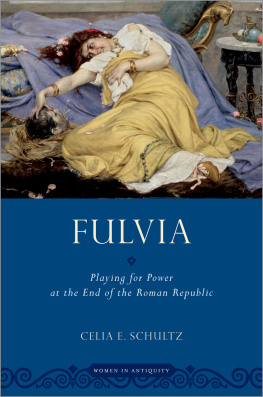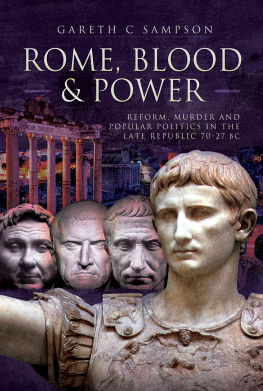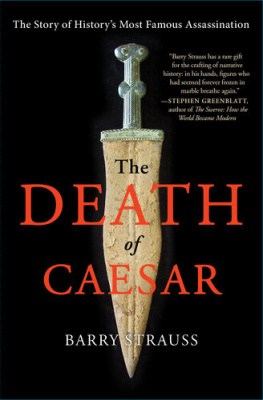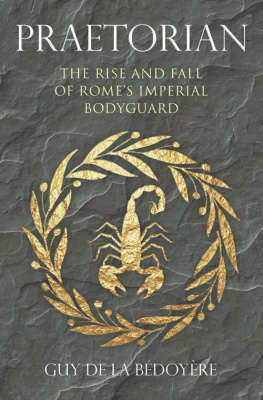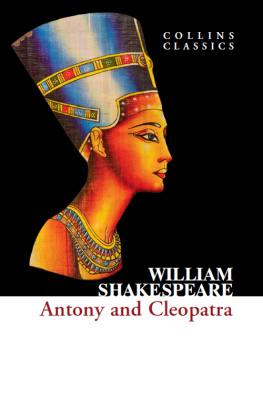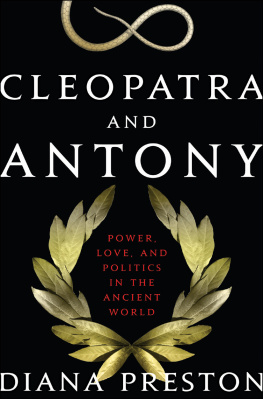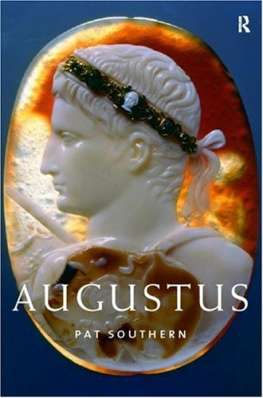FULVIA
WOMEN IN ANTIQUITY
Series Editors: Ronnie Ancona and Sarah B. Pomeroy
This book series provides compact and accessible introductions to the life and historical times of women from the ancient world. Approaching ancient history and culture broadly, the series selects figures from the earliest of times to late antiquity.
Cleopatra
A Biography
Duane W. Roller
Clodia Metelli
The Tribunes Sister
Marilyn B. Skinner
Galla Placidia
The Last Roman Empress
Hagith Sivan
Arsino of Egypt and Macedon
A Royal Life
Elizabeth Donnelly Carney
Berenice II and the Golden Age of Ptolemaic Egypt
Dee L. Clayman
Faustina I and II
Imperial Women of the Golden Age
Barbara M. Levick
Turia
A Roman Womans Civil War
Josiah Osgood
Monica
An Ordinary Saint
Gillian Clark
Theodora
Actress, Empress, Saint
David Potter
Hypatia
The Life and Legend of an Ancient Philosopher
Edward Watts
Boudica
Warrior Woman of Roman Britain
Caitlin C. Gillespie
Sabina Augusta
An Imperial Journey
T. Corey Brennan
Cleopatras Daughter
And Other Royal Woman of the Augustan Era
Duane W. Roller
Perpetua
Athlete of God
Barbara K. Gold
Zenobia
Shooting Star of Palmyra
Nathanael Andrade
Eurydice and the Birth of Macedonian Power
Elizabeth Donnelly Carney
Melania the Younger
From Rome to Jerusalem
Elizabeth A. Clark
Sosipatra of Pergamum
Philosopher and Oracle
Heidi Marx

Oxford University Press is a department of the University of Oxford. It furthers the Universitys objective of excellence in research, scholarship, and education by publishing worldwide. Oxford is a registered trade mark of Oxford University Press in the UK and certain other countries.
Published in the United States of America by Oxford University Press
198 Madison Avenue, New York, NY 10016, United States of America.
Oxford University Press 2021
All rights reserved. No part of this publication may be reproduced, stored in a retrieval system, or transmitted, in any form or by any means, without the prior permission in writing of Oxford University Press, or as expressly permitted by law, by license, or under terms agreed with the appropriate reproduction rights organization. Inquiries concerning reproduction outside the scope of the above should be sent to the Rights Department, Oxford University Press, at the address above.
You must not circulate this work in any other form and you must impose this same condition on any acquirer.
Library of Congress Cataloging-in-Publication Data
Names: Schultz, Celia E., author.
Title: Fulvia : playing for power at the end of the Roman republic / Celia E. Schultz.
Other titles: Women in antiquity.
Description: New York : Oxford University Press, [2021] |
Series: Women in antiquity | Includes bibliographical references and index.
Identifiers: LCCN 2021007932 (print) | LCCN 2021007933 (ebook) |
ISBN 9780197601839 (paperback) | ISBN 9780190697136 (hardback) |
ISBN 9780190697150 (epub) | ISBN 9780190697143 (updf) |
ISBN 9780190697167 (oso)
Subjects: LCSH: Fulvia, active 1st century B.C. | WomenRomeBiography. |
RomeHistoryRepublic, 26530 B.C.
Classification: LCC DG260.F85 S34 2021 (print) |
LCC DG260.F85 (ebook) | DDC 937/.05092 [B]dc23
LC record available at https://lccn.loc.gov/2021007932
LC ebook record available at https://lccn.loc.gov/2021007933
DOI: 10.1093/oso/9780190697136.001.0001
For my mother,
Susann Esther Feingold-Schultz,
who would have enjoyed this project
Contents
Maps
Figures
I am very grateful to Sarah Pomeroy and Ronnie Ancona, the editors of Oxford University Presss Women in Antiquity series, for the invitation to add a volume on Fulvia, whom I have long considered the most interesting of a whole cohort of remarkable aristocratic women who took part in the major events of the last decades of Romes Republic. It is high time that Fulvia take her place on the bookshelf alongside her more famous contemporaries who have already received biographies of their own in this series and outside it: her sister-in-law, Clodia; her romantic successor, Cleopatra, Queen of Egypt; Terentia and Tullia, the wife and daughter of Fulvias bte noire, Cicero; and Servilia, the mother of an enemy of one of her husbands. Even the unnamed woman commonly known as Turia already has a volume to herself.
In keeping with the mission of this series, I have aimed to make Fulvia as accessible to as many readers as possible, while at the same time providing enough references in the notes to make this book useful to those who might want to pursue their own research. I have therefore limited citations, for the most part, to recent and important Anglophone scholarship, and I have eschewed comprehensive lists of ancient references. For tales of Fulvia and her contemporaries, I have usually cited only the fullest or most famous versions found in ancient authors.
This book is, as any book is, the product of a lot of assistance from many people. Lorena Bolaos Abarca helped with translations of Spanish-language publications. Lucio Benedetti tracked down other, more elusive publications and generously shared the image of the sling bullet that appears in navigated a week-long road trip through central and northern Italy to see collections of sling bullets. Mafalda Cipollone and Luana Cenciaioli provided access to the collection in the Museo Archeologico Nazionale dellUmbria in Perugia; Carolina Ascari Raccagni gave us a tour of the Museo Archeologico Statale di Ascoli Piceno and a lovely introduction to the town. Once I returned home, Alan Taub, at the University of Michigan School of Engineering, and his students helpfully consulted on the properties of lead. Jessica Clark, Elizabeth Greene, Gwynaeth McIntyre, Patrick Tansey, Tom Hillard, Josiah Osgood, and Kathryn Welch all patiently answered numerous questions. Kathryn Welch and Judith Hallett also graciously shared some of their unpublished research. Stefan Vranka and his staff at OUP kept me on track, and an anonymous reviewer offered many sharp-eyed suggestions for improvement. John Muccigrosso, Glenn Storey, Stephen Wheeler, Lynn Orr, Davida Manon, Miriam Manon, and especially Kathryn Welch all read early drafts of parts of this project. Audiences at the Pennsylvania State University, the University of Mississippi, and the University of Colorado let me test out some ideas, as did my students and colleagues at the University of Michigan. Julia Jeffs created the three stemmata included here, and Jan Dewitt weeded out numerous errors and omissions in the typescript. I put the finishing touches on this project during a delightful year at the Swedish Collegium for Advanced Study. Whatever erroneous bits remain are my own responsibility. I owe special thanks to Fulvia, for having such an interesting life that falls neatly into five chapters, complete with climax and dnouement.

